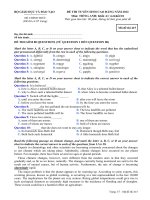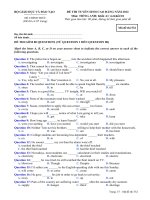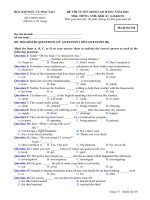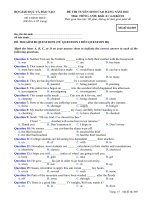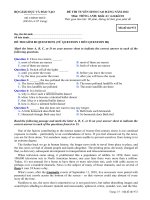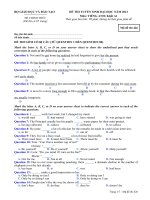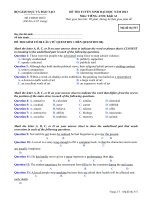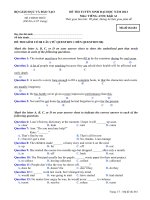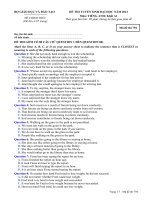- Trang chủ >>
- Đề thi >>
- Đề thi tuyển dụng
Đề thi nâng bậc chuyên viên BIDV 2012 - môn tiếng Anh A đọc hiểu
Bạn đang xem bản rút gọn của tài liệu. Xem và tải ngay bản đầy đủ của tài liệu tại đây (279.03 KB, 59 trang )
C HIU – TRÌNH A
I. TRUE/FALSE
1. Test 1
English Town
The building company Hong Kong Housing is building a new suburb in
Shanghai, a city with a population of more than 15 million people. But this suburb is
not like other parts of Shanghai. It is a little piece of England. The name of the new
area is "English Town". The manager of Hong Kong Housing, Shi Guangsheng, says
many people in this area of China want to buy an English house and live in an English
town.
"This town is like Bristol or Chester. There is an English square and there are
pigeons to feed like in Trafalgar Square, London. There are four English-style pubs
and you can buy English beer to drink. There is a canal and you can row a boat there
like in Cambridge."
Are there any cricket fields? "No, there aren't any places to play cricket because
nobody in Shanghai can play this game. But there is a football stadium like those in
England. And the thing we are very proud of is our shopping street. There are several
shops where you can buy traditional English food like fish and chips or Christmas
Pudding."
The rich Shanghai businessman can do some gardening too. For with every
house in "English Town", there is an English lawn and there are long gardens with
ponds and tall hedges.
But there is one problem. The houses in this part of town cost a minimum of
$400,000!
La chn đáp án đúng nht:
1. "English Town" is in a Chinese city.
A. True
B. False
2. These houses are only for English people to buy.
A. True
B. False
3. There are pigeons in all the gardens.
A. True
B. False
4. There aren't any cricket fields in the new development.
A. True
B. False
5. Shi Guangsheng feels proud about the English-style shops.
A. True
B. False
6. The houses are cheap.
c hiu – Trình đ A
2
A. True
B. False
2. Test 2
Folktale
Folklore is a body of stories that reflect a culture's beliefs, traditions, and values.
Often the characters in folktales are real people. When a folktale tells of the actions of
a real person, its purpose is to reveal some admired quality of that person's character.
Other folktales use characters that are larger than life to pass on truths that are valued
by the culture. Characters like Annie Oakley and Pecos Bill are two examples from
the American culture.
Folktales have been told for centuries, and all cultures have them. At one time,
all folklore was part of an oral tradition and was passed on by word of mouth. Today,
folklore finds its way into poetry, song lyrics, and fables.
The folktale below is an American tale about George Washington. What quality
of George Washington's character is the tale trying to highlight? Why?
George Washington's father had a beautiful garden. In his garden there were
many flowers and trees. His favorite tree was the cherry tree. He liked the pink
flowers in the spring and the sweet, red fruit in the summer.
George was just a little boy. He was six years old. He had a new ax, and he liked
to cut things in the garden. One day, he cut down the cherry tree by mistake. When he
saw the cherry tree on the ground, he felt very badly.
Later that day, George's father saw the tree on the ground. He was angry. He
called his son. "George," he asked, "Do you know who cut down my cherry tree?"
George was afraid because his father was angry, but he wanted to tell the truth.
"Father," George said, "I cannot tell a lie. I cut down the cherry tree." George's father
took the boy in his arms and hugged him. He was happy because his son had told the
truth.
La chn đáp án đúng nht:
7. The characters used in folktales are never real people.
A. True
B. False
8. A culture's beliefs, traditions, and values are often revealed in folktales.
A. True
B. False
9. Folktales never use characters that are larger than life.
A. True
B. False
10. Folktales are used to pass on truths that are valued by the culture.
A. True
B. False
c hiu – Trình đ A
3
11. Annie Oakly and Pecos Bill are real people.
A. True
B. False
12. In the folktale above, the tale tries to highlight the truthlessness of George
Washington.
A. True
B. False
3. Test 3
Liverpool
Liverpool is a city and metropolitan borough in Merseyside in North West
England, on the north side of the Mersey estuary.
The city is governed by Liverpool City Council, one of five councils within
Merseyside. The population of the borough in 2002 was 441,477, and that of the
Merseyside conurbation was 1,362,026. Liverpool is the second largest export port of
the United Kingdom.
Whilst it has lost most of its manufacturing base, Liverpool is still internationally
famous as a port, and the city from where The Beatles originated. In sport terms, it
boasts two internationally known football clubs, Liverpool F.C. and Everton F.C. In
the year 2008, Liverpool will become the European Capital of Culture.
Liverpool runs directly into Bootle in Sefton, and Huyton in Knowsley. It faces
Wallasey and Birkenhead across the River Mersey.
Inhabitants of Liverpool are officially known as "Liverpudlians", but more
commonly known as "Scousers". They are noted for their distinctive accent, called
Scouse.
La chn đáp án đúng nht:
13. Liverpool has a population of less than half million people.
A. True
B. False
14. Liverpool is the second largest export port of the United Kingdom.
A. True
B. False
15. Liverpool is the city from where The Beatles originated.
A. True
B. False
16. Liverpool has one football team.
A. True
B. False
17. People from Liverpool are called Liverpudlians.
A. True
c hiu – Trình đ A
4
B. False
II. CHOOSE THE BEST ANSWER
4. Test 4
Learning English
Today, millions of people want to learn or improve their English but it is
difficult to find the best method. Is it better to study in Britain or America or to study
in your own country?
The advantages of going to Britain seem obvious. Firstly, you will be able to
listen to the language all the time you are in the country. You will be surrounded
completely by the language wherever you go. Another advantage is that you have to
speak the language if you are with other people. In Vietnam, it is always possible, in
the class, to speak Vietnamese if you want to and the learning is slower.
On the other hand, there are also advantages to staying at home to study. You
don't have to make big changes to your life. As well as this, it is also a lot cheaper
than going to Britain but it is never possible to achieve the results of living in Britain.
If you have a good teacher in Vietnam, I think you can learn in a more concentrated
way than being in Britain without going to a school.
So, in conclusion, I think that if you have enough time and enough money, the
best choice is to spend some time in Britain. This is simply not possible for most
people, so being here in Vietnam is the only viable option. The most important thing
to do in this situation is to maximise your opportunities: to speak only English in class
and to try to use English whenever possible outside the class.
La chn đáp án đúng nht:
18. What is the article about?
A. How many people learn English
B. The best way to learn English.
C. English schools in England and America.
19. It is hard for many people to______.
A. go to Britain or America
B. know how to study English
C. study in their own country
20. What is one of the advantages of going to Britain to learn English?
A. There are no Vietnamese in Britain.
B. You will have to speak English and not your language.
C. The language schools are better.
21. What is one of the advantages of staying in your country to learn English?
A. The teachers aren't very good in Britain.
B. You have to work too hard in Britain.
C. Your life can continue more or less as it was before.
22. People who don't have a lot of time and money should______.
c hiu – Trình đ A
5
A. learn English in Britain
B. try and speak English in class more often
C. stay in Vietnam
5. Test 5
Question About the Electric Guitar
Welcome to AMERICAN MOSAIC VOA's radio magazine in Special
English. This is Doug Johnson. On our program today:
We play electric guitar music.
Our VOA listener question this week comes from Vietnam. Long Quang Bui
asks about the musical instrument called the electric guitar.
Music experts say the guitar is probably the most popular musical instrument
around the world today. It is used to play many different kinds of music.
The electric guitar was one result of efforts by musicians to use electricity to
create louder string instruments. They were not able to solve some of the technical
problems until the nineteen-thirties. Les Paul was among the first to play an electric
guitar. Listen to one of his hit recordings, "Meet Mister Callaghan."
In its early years, music experts debated the idea of the electric guitar being a
true instrument. Some claimed it did not produce a real musical sound. Country and
jazz musicians also defended the music made by the electric guitar.
One of these defenders was jazz man Charlie Christian. Music experts say he
created the sound of the electric guitar that led to the modern electric guitar music of
today. Listen to a recording of Charlie Christian playing with the Benny Goodman
jazz group in nineteen-thirty-nine. The song is "Flying Home."
One modern electric guitar player who followed Charlie Christian is the world
famous blues musician B. B. King. He calls his guitar "Lucille". We leave you now
with B. B. King and Lucille playing their famous recording, "The Thrill Is Gone."
This is Doug Johnson. I hope you enjoyed our program today. And I hope you
will join us again next week for AMERICAN MOSAIC VOA's radio magazine in
Special English.
La chn đáp án đúng nht:
23. What is the most popular musical instrument in the world today?
A. The guitar
B. The piano
C. The drums
24. In what decade did musicians start using the electric guitar?
A. In the nineteen-fifties
B. In the nineteen-thirties
C. In the nineteen-forties
25. Who defended the music made by the electric guitar in the early years?
A. Both country and jazz musicians
c hiu – Trình đ A
6
B. Only jazz musicians
C. Only country musicians
26. Who created the sound of the electric guitar that led to the modern electric
guitar music of today?
A. B. B. King
B. Les Paul
C. Charlie Christian
27. What is the name of one of the very early electric guitar recordings?
A. "Lucille"
B. "The Thrill Is Gone"
C. "Flying Home"
28. One modern electric guitar player is the world famous blues musician.
A. B. B. King
B. Les Paul
C. Charlie Christian
6. Test 6
Christopher Columbus
Christopher Columbus was born in Genoa, Italy in 1451. While spending most
of his early years at sea, Columbus began to believe that he could find a shortcut to the
Indies by sailing west across the Atlantic Ocean. Unfortunately, the King of Portugal
refused to finance such a trip, and Columbus was forced to present his idea to the
King and Queen of Spain. In 1492, King Ferdinand and Queen Isabella agreed to pay
for his trip. They gave him a crew and three ships, the Nina, Pinta and Santa Maria.
Columbus sailed aboard the Santa Maria.
The trip was long and hard. Many sailors grew restless and wanted to turn
around. After two months at sea, land was finally sighted. The ships docked on the
island of Hispaniola. Columbus named the native people he saw "Indians", because he
believed he had found the shortcut he was looking for. In actuality, Columbus found
North America, a brand new continent at that time. Columbus, however, couldn't be
convinced. He died with the belief he had found the shortcut to the Indies. Soon,
however, other explorers and nations understood the importance of his discoveries.
Columbus' discoveries set the stage for the Age of Exploration, one of the most
fascinating and exciting times in world history.
La chn đáp án đúng nht:
29. Where was Christopher Columbus born?
A. The New World
B. Portugal
C. Spain
D. Italy
30. Christopher Columbus sailed to_____.
c hiu – Trình đ A
7
A. the north
B. the south
C. the west
D. the east
31. Which is NOT true?
A. Columbus was born in Italy.
B. Columbus received three ships and a crew from the King and Queen of
Spain.
C. Columbus found a shortcut to the Indies.
D. The journey across the Atlantic took two months.
32. Which of the following was NOT one of his ships?
A. Nina
B. Isabella
C. Pinta
D. Santa Maria
33. Why was Christopher Columbus very important?
A. He believed he found a shortcut to the Indies.
B. He first used the word "Indians".
C. He discovered a whole new continent.
D. He was one of the bravest explorers of all time.
7. Test 7
George Washington
George Washington was born in 1732, near Fredericksburg, Virginia. At age 16,
he went to live with his brother Lawrence, in what would become his future home -
Mount Vernon.
Washington's early military career was unsuccessful. He was forced to surrender
Fort Necessity to French forces in 1753. In 1755, Washington, serving under General
George Braddock, was forced to surrender Fort Duquesne (pronounced Du-Kain) to
French forces. In 1758, however, Washington helped take Fort Duquesne back. He
married Martha Custis in 1759.
As relations between the colonies (America) and England worsened, Washington
was named commander of the Continental (American) Army in 1775. Washington
was such a great leader, that after America had won its independence, he was elected
the first president.
Today George Washington is honored on dollars, coins, and stamps. He has a
monument, a state, and countless cities and towns named after him.
La chn đáp án đúng nht:
34. What word would best describe this passage?
A. biography
c hiu – Trình đ A
8
B. autobiography
C. story
D. legend
35. Where was George Washington born?
A. Virginia
B. Fort Duquesne
C. Fort Necessity
D. Frederick
36. Which of the following events happened first?
A. George Washington was named commander of the Continental Army.
B. George Washington was elected president.
C. George Washington helped to take Fort Duquesne back.
D. George Washington moved to Mount Vernon.
37. What event happened second?
A. George Washington surrendered at Fort Necessity.
B. George Washington married Martha Custis.
C. George Washington was elected president.
D. George Washington was honored on coins.
38. Which of the following do not honor George Washington?
A. stamps
B. coins
C. cities
D. countries
8. Test 8
PRESIDENT BARACK OBAMA
Barack Obama is the 44th President of the United States.
His story is the American story — values from the heartland, a middle-class
upbringing in a strong family, hard work and education as the means of getting ahead,
and the conviction that a life so blessed should be lived in service to others.
With a father from Kenya and a mother from Kansas, President Obama was born
in Hawaii on August 4, 1961. He was raised with help from his grandfather, who
served in Patton's army, and his grandmother, who worked her way up from the
secretarial pool to middle management at a bank.
After working his way through college with the help of scholarships and student
loans, President Obama moved to Chicago, where he worked with a group of churches
to help rebuild communities devastated by the closure of local steel plants.
He went on to attend law school, where he became the first African-American
president of the Harvard Law Review. Upon graduation, he returned to Chicago to
c hiu – Trình đ A
9
help lead a voter registration drive, teach constitutional law at the University of
Chicago, and remain active in his community.
President Obama's years of public service are based around his unwavering
belief in the ability to unite people around a politics of purpose. In the Illinois State
Senate, he passed the first major ethics reform in 25 years, cut taxes for working
families, and expanded health care for children and their parents. As a United States
Senator, he reached across the aisle to pass groundbreaking lobbying reform, lock up
the world's most dangerous weapons, and bring transparency to government by
putting federal spending online.
He was elected the 44th President of the United States on November 4, 2008,
and sworn in on January 20, 2009. He and his wife, Michelle, are the proud parents of
two daughters, Malia, 10, and Sasha, 7.
La chn đáp án đúng nht:
39. Where did President Obama's mother come from?
A. Kentucky
B. Kenya
C. Kansas
40. What subject did President Obama used to teach?
A. Employment Law
B. Constitutional Law
C. Community Law
41. Where did Barack Obama move to after finishing college?
A. Illinois
B. Hawaii
C. Chicago
42. Which of these things did President Obama not
do during his time in the
Illinois state senate?
A. Expand healthcare for children and parents
B. Abolish the death penalty
C. Cut taxes for working families
43. Which of these things did President Obama do while he was a United
States Senator?
A. Lock up the world's most dangerous criminals
B. Lead a voter registration drive
C. Put federal spending online
44. What date was President Obama sworn in as President?
A. 11/04/08
B. 04/11/08
C. 20/01/09
c hiu – Trình đ A
10
9. Test 9
Dear Isabelle,
If you look at a map of my country, you will find English names like London or
Windsor, French names like Trois Rivières or Indian names likes Manitoba,
Saskatchewan or Winnipeg. Strange, isn't it? Let me tell you more about my country.
But you know its name, don't you? It's Canada, of course and I'm Canadian. The
history of my country is longer than that of the United States: a Viking, Leif Erikson,
discovered Canada in 986. That was a long time before Christopher Columbus
discovered America in 1492.
The first explorers Jacques Cartier and Champlain were French, which is why
they called the country New France. But there were more English people than French
people in Canada and it became English in 1763. After many wars Canada became
independent in 1867. And you know, Canadian soldiers came to help France and
England against Germany in 1917 and 1944. Canada is larger than the United States,
did you know that? Its area is about ten million square kilometres, that is eighteen
times as big as France and forty times as big as the United Kingdom but only twenty-
five million people live there. If you look at a map, you can see Canada is near
Alaska. As you can imagine, it is very cold in winter but it is also very hot in summer.
Only six million of us speak French. But the French say we have a funny accent and
use funny words. But you know, we are neither English nor French. We are
Americans, North Americans but we are not far from the USA. We use dollars,
Canadian dollars of course, and there are no frontiers between our country and the
United States.
So, if you go to America one day, don't forget to visit Canada.
Love from your friend,
Rose
La chn đáp án đúng nht:
45. Where does Rose live?
A. in India
B. in England
C. in Canada
46. Who discovered this country?
A. Leif Erikson
B. Christopher Columbus
C. Jacques Cartier
47. This country is_____.
A. as big as France
B. bigger than France
C. smaller than France
48. When did this country become independent?
A. 1492
B. 1867
c hiu – Trình đ A
11
C. 1944
49. Most Canadians speak French.
A. True
B. False
10. Test 10
Taiwan
The country of Taiwan is a group of 86 small islands. The main island which is
also called Taiwan, the Penghus (the Pescadores) which has 64 islands, and 21 other
islands. The country is situated off the coast of Mainland China, about halfway
between Hong Kong and Japan. It has a total land area of 36,000 square kilometers
and a population of about 22,000,000 people.
The main island comprises 98% of the land area or 35,280 square kilometers.
The island is long and thin, running almost directly north and south. It is 390
kilometers (250 miles) long and 140 kilometers (90 miles) at its widest point. The
Tropic of Cancer crosses Taiwan making the northern two-thirds of the island
subtropical and the southern third tropical. There is a large mountain range running
down the center of the island. The tallest mountain in Taiwan is Yu Shan or Mount
Jade. It is 3,952 meters (12,966 feet) high.
La chn đáp án đúng nht:
50. Where is Taiwan?
A. Next to Japan
B. Between Japan and Hong Kong
C. Between China and Hong Kong
51. What is the Taiwan's highest mountain?
A. Tropic of Cancer
B. Mountain Range
C. Jade Mountain
52. Where does the mountain range run?
A. From Hong Kong to Japan
B. Across Taiwan
C. Down the center of Taiwan
53. What is the land area of the main island of Taiwan?
A. 35,280 square kilometers
B. 22,000 square kilometers
C. 86,000 square kilometers
54. How many islands make up the Pescadores?
A. 64 islands
B. 86 islands
C. 21 islands
c hiu – Trình đ A
12
11. Test 11
If you want to advance in your career, you will have to make some careful
decisions about which jobs you take. Evaluate a job offer for the value it has to your
career. It may mean sacrifices at first. You may have to move to a different region or a
different country to get a job that is right for you. You may have to work late hours, at
least temporarily. You might even have to take a lower salary for a job that offers you
the experience that you need. But you should never accept a job if it is not related to
your career goals. Accepting a job that it not within your career path will not give you
the training or experience you need or want. You will find yourself frustrated in such a
position and consequently will not perform your best. This will have an effect on the
people around you, who will not feel as if you are being part of the team. The best
advice is to think carefully before accepting any position and make sure the job is one
you want to have.
La chn đáp án đúng nht:
55. What is the most significant factor in evaluating a job?
A. Location
B. Salary
C. Value to your career
D. How much you will you like it
56. What is NOT mentioned as sacrifice for a valuable job?
A. Moving
B. No benefits
C. Bad hours
D. Low salary
57. What kind of job should you never accept?
A. One not related to your career goals.
B. One that requires a long commute.
C. One that has a negative effect on people around you.
D. One that makes you work hard.
58. What is wrong with taking a job outside your career path?
A. You will earn less.
B. You won't perform as well.
C. People will give you advice.
D. You will be stuck on a team.
59. What is the author's best advice?
A. Take the first job offered.
B. Consider changing careers.
C. Don't work with other people.
D. Think before accepting a job.
c hiu – Trình đ A
13
12. Test 12
In 1274, Italian explorers Marco and Niccolo Polo set out on a twenty-four year
journey in which they traveled the famous Silk Road from Italy, through brutal deserts
and towering mountains to eastern China. They traveled over 4,000 miles in all.
Marco and Niccolo were among the very first Europeans to explore the fabled empire
of China. In China, Marco Polo even worked for ruler Kublai Khan. Polo detailed his
experiences and findings in China by writing a book. Polo described materials and
inventions never before seen in Europe. Paper money, a printing press, porcelain,
gunpowder and coal were among the products he wrote about. He also described the
vast wealth of Kublai Khan, as well as the geography of northern and southern China.
European rulers were very interested in the products Polo described. However,
trading for them along the Silk Road was dangerous, expensive and impractical.
European rulers began to wonder if there was a sea route to the east to get the products
they wanted at a reasonable price.
La chn đáp án đúng nht:
60. How many years did Marco Polo's journey to China last?
A. 74
B. 24
C. 20
D. 12
61. Marco Polo came to China from what country?
A. Europe
B. England
C. Italy
D. China
62. Marco Polo traveled to China with Kublai Khan.
A. True
B. False
63. While traveling in China, Marco Polo observed many new discoveries.
Which of the following is not one of the discoveries?
A. paper money
B. cigarettes
C. gunpowder
D. coal
64. What word below best captures the meaning of "impractical" in the
sentence:
“However, trading for them along the Silk Road was dangerous, expensive and
impractical”.
A. not funny
B. ridiculous
c hiu – Trình đ A
14
C. positive
D. too difficult
13. Test 13
Martin is in a hurry. He is late to work again. Martin's boss doesn't like it when
he is late. Martin was late last week. His boss told him not to be late again. “You can’t
be late anymore,” said Martin’s boss. "I mean it." Martin thinks he might lose his job
if he is late again.
The time is now 7:15 am. Martin needs to be to work by 7:30. It takes him 22
minutes to drive to work. “Things don’t look good,” he says to himself. Martin runs
out of the house. He jumps in his car. He puts the car in reverse. He backs up without
looking.
BOOM!
There is a sound like someone hitting a drum. Martin’s car jerks to a stop. He
has hit the car parked behind him. “Oh no!” Martin exclaims. He is angry now. Martin
looks at his watch. It is 7:18. He needs to get to work. He looks around. There is no
one on the street. There is no one nearby. He looks in the parked car. It is empty.
Martin drives off quickly. He gets to work 10 minutes late. Martin’s boss is not
around. “Thank goodness,” he says to himself. He stops worrying. He sits at his desk
to work.
During lunch, Martin goes out to the parking lot. He looks at his car. There is a
big dent in the back. Then he thinks about the other car - the car he hit this morning. "I
know that car is damaged too," he thinks. He feels guilty. “That was not right,” Martin
says to himself. He will see if the car is still outside his house when he gets off work.
La chn đáp án đúng nht:
65. Martin is in a hurry. What does this mean?
A. He is running.
B. He is angry.
C. He is late.
D. He is moving fast.
66. Martin's boss says, "I mean it." What does this mean?
A. He is serious.
B. He is angry.
C. He is sad.
D. He is interested.
67. What does Martin think will happen if he is late to work again?
A. He will get a pay cut.
B. He will need to buy a watch.
C. He will get fired from his job.
D. He will need to learn to tell time.
68. If Martin leaves the house at 7:15, what time would he get to work?
c hiu – Trình đ A
15
A. 7:32
B. 7:37
C. 7:40
D. 7:52
69. What is the loud noise?
A. Police sirens.
B. Martin yelling.
C. Someone hitting Martin's car.
D. Martin hitting another car.
70. Martin checks if there is anyone nearby. What does nearby mean?
A. in
B. next to
C. close to
D. far (away) from
71. Why doesn't Martin get in trouble with his boss today?
A. His boss is not around.
B. Martin gets to work on time.
C. His boss feels sorry for him.
D. Martin says he is sorry for being late.
72. How do Martin's feelings change during the story?
A. from hurried, to guilty, to angry
B. from angry, to guilty, to hurried
C. from hurried, to angry, to guilty
D. from angry, to hurried, to angry
73. Why did Martin look around after he hit the car?
A. He needed help.
B. He wanted a ride to work.
C. He needed to check the time.
D. He wanted to check if anyone saw him.
74. What does it mean to feel guilty?
A. to feel bad about doing something
B. to feel worried about doing something
C. to feel unsure about doing something
D. to feel like you want to change something
14. Test 14
Tracey is starting a new school today. She is very sad. She is very scared. “I
don’t want to go to school today,” Tracey tells her dad. “I understand, sweetheart,”
Dad says. “Starting a new school can be very scary.” Tracey has moved to a new
c hiu – Trình đ A
16
town. She has moved to a new house. She is starting a new school today. She has done
all of this in a week!
“I feel sick,” Tracey says. “My stomach hurts. I can’t eat breakfast.” “I think that
is because you are nervous” Dad says. He brushes Tracey’s hair down. He gives her a
little hug. “Try drinking just a little juice. Then I will walk with you to school.”
Tracey and her dad walk to school.
Tracey thinks about many things. Will I make friends? Will I like my teacher?
What if I don’t know the answer to a question? Will kids laugh at me? What if no one
likes me?
“We’re here,” says Dad. Tracey looks up at the big building. Her other school
was small. Tracey wishes she could run away. She knows she cannot. She takes a deep
breath. She walks up the steps to school.
She walks into her third grade classroom. “That must be Tracey,” she hears a
boy say. “Hello, Tracey!” “Welcome, Tracey!” “Let me show you around.” Everyone
seems kind. Tracey feels a little better. She is still not happy. She is still a little scared.
She cannot eat her lunch.
Dad picks Tracey up after school. “How was your day?” he asks. “Okay,” she
says. “It will get better,” Dad says. “Big changes are hard.” “I know,” says Tracey.
She reaches for her dad’s hand to hold as they walk home.
La chn đáp án đúng nht:
75. Why is Tracey sad and scared?
A. She is moving to a new house today.
B. She is moving to a new town today.
C. She is starting a new school today.
D. She is walking to school alone today.
76. Why can't Tracey eat breakfast?
A. She has no food.
B. Her stomach hurts.
C. She is late for school.
D. She does not like the food.
77. Why does Tracey's dad think she feels sick?
A. Because she is sleepy.
B. Because she is nervous.
C. Because she has a cold.
D. Because she ate too much.
78. In this story, what does nervous mean?
A. to be happy
B. to be hungry
C. to be mad
D. to be scared
79. What does Dad tell Tracey to do before school?
c hiu – Trình đ A
17
A. stop crying
B. get her bag
C. drink some juice
D. put on her shoes
80. What does Tracey think about most as she walks?
A. math
B. reading
C. having friends
D. her teachers
81. When does Tracey seem to be brave?
A. When she cannot eat.
B. When she feels better.
C. When she holds her dad's hand.
D. When she walks up the steps to the school.
82. What is Tracey's new school like?
A. big
B. dirty
C. loud
D. small
83. How do the children in Tracey's class seem?
A. kind
B. pretty
C. funny
D. not very nice
84. What does Tracey learn?
A. kids can be mean.
B. big schools are hard.
C. big changes are hard.
D. it is good to eat lunch.
15. Test 15
Paola and Imran have been married for 8 years. They have had many good times
together. They have travelled the world together. They have two little girls together.
They have started a chocolate business together. Lately, Paola and Imran have been
fighting a lot. Business at the chocolate store is slow. Imran thinks it is Paola’s fault.
They are having trouble with money. Paola thinks Imran spends too much. One
evening, Paola decides to visit her mom for advice. Paola knocks on her mom’s door.
Paola’s mom is happy. It is a surprise visit. She quickly sees, however, that something
is wrong.
c hiu – Trình đ A
18
Paola looks sad and tired. “Paola, what is the matter?” Mom asks. Paola tells her
mom all that is going on. Mom smiles gently. She rubs Paola’s back. Then she tells
Paola a story. “Your father and I have a wonderful marriage. But we don’t always get
along. There was a time when things were very bad between us. We fought all the
time. You were just a little girl. One day we watched you playing on the floor. We
knew we wanted to make our marriage work. We loved you very much. We loved
each other very much. We knew we had to work harder on our marriage.”
“What did you do?” asks Paola. “We agreed to talk more. We planned a special
night each week for the two of us. We went to see someone who helps people with
their marriages,” Mom says. “It was worth it. I can’t imagine not having your father in
my life.” Paola begins to feel better. “You are right,” she says. “What Imran and I
have is worth working for.”
La chn đáp án đúng nht:
85. Why does Paola want to see her mom?
A. to have dinner
B. to get advice
C. to have a laugh
D. to see how she is doing
86. Where does the talk take place?
A. at Mom's house
B. at a restaurant
C. at Paola's house
D. at the chocolate store
87. Why does Mom seem to know how Paola feels?
A. She is a bad guesser.
B. She has been told by Imran.
C. She and Paola have discussed this problem before.
D. She has experienced the same problem before in her own marriage.
88. How does Paola feel at the end of the talk with her Mom?
A. sad
B. better
C. grim
D. stupid
89. What does the reader NOT
learn in this story?
A. What Imran has to say.
B. Why Paola visits her mom.
C. How many kids Paola and Imran have.
D. What kind of business Paola and Imran have.
16. Test 16
c hiu – Trình đ A
19
I live in a house by the water. I sit by the water each day. I take my bag there
with me. In it, I pack a book, a blanket, a chair, and a basket of food. I walk down my
back steps and sit in the same spot along the grass. When I go out to the water in the
morning, I am alone. I hear the water. I see the boats. I feel calm. It is the part of the
day I like best.
Later, some children come to play by the water. It is afternoon. I hear them
laughing. I see them play ball. “Nestor, Nestor!” the children yell when they see me
on the beach. I wave and smile. “Play ball with us, Nestor!” the children shout. No,
thanks,” I say. "I am too old to play ball. I walk with a cane and my hands are no
longer good at catching."
I try to read my book, but it is hard with all the noise. I watch mothers and
fathers fish along the shore. I am happy. I hear the water. I see the boats. I eat my
lunch.
Later, the sky gets dark. I gather all of my things and go back to the house. I get
in bed. I hear the water through my open window. The sound puts me to sleep.
La chn đáp án đúng nht:
90. Where does Nestor live?
A. on a farm
B. on a mountain top
C. in a boat on the water
D. in a house by the water
91. What does Nestor do each day?
A. sit by the water
B. play by the water
C. run by the water
D. swim in the water
92. What kind of person does Nestor seem to be?
A. calm
B. sad
C. loud
D. young
93. What does the children's noise make it hard for Nestor to do?
A. eat
B. catch fish
C. read
D. sleep
94. How do Nestor's feelings change during the story?
A. from calm to sleepy to happy
B. from sleepy to calm to happy
C. from calm to happy to sleepy
c hiu – Trình đ A
20
D. from happy to sleepy to calm
95. What does Nestor mean when he says that the sky gets dark?
A. that it is night.
B. that it is raining.
C. that wind is blowing.
D. that the sky is angry.
96. What is Nestor's favorite part of the day?
A. the morning
B. when he is watching the children
C. the afternoon
D. the night
97. When does Nestor hear the water?
A. only in the morning
B. only in the afternoon
C. only in the night
D. all the time
17. Test 17
I am sitting in a chair next to Momma’s bed. I am watching her get ready for a
party. She opens the beautiful jewelry box on her nightstand. It is the size of a
shoebox. It is wooden. It has colorful stones on top. They are red, green, yellow and
blue. To me, the box looks magical. It looks like it has special powers.
“Now, you know you must never touch this box, right?” Momma says. I feel like
she knows exactly what I am thinking. I just want to touch it. I just want to open it.
I just want to try on all the jewelry inside and dance around the room!
“Yes, Momma,” I say. “I know.” What do I know? I know Momma has always
told me not to touch the box. She has said it since I was a little girl. “You are not old
enough to wear my jewelry,” Momma says. I am 11-years-old now! What is the big
deal?
I know that when Momma puts on the rings and bracelets from the box, she
looks different. She seems to glow. There is one necklace with a yellow stone like a
tiger’s eye. When Momma puts this on, she seems to float instead of walk. Her feet do
not seem to touch the ground. She moves lightly and gracefully. She moves without
effort.
Momma kisses me goodnight. She leaves for the party. I run to the window to
wave to her, but she is already gone. Tonight I am very curious. Just one touch.
I sit on the edge of Momma’s bed. I place my hand on the nightstand. I pause. I
think. My hand moves up and rests on the jewelry box. The box quickly flips open by
itself! Jewels fly into the air. They dance around my head. I feel strange. I fall down to
the floor.
I wake up in a place I have never seen before.
c hiu – Trình đ A
21
La chn đáp án đúng nht:
98. Where does most of this story take place?
A. at a party
B. in a pretend place
C. outside a window
D. in Momma's bedroom
99. Who is telling the story?
A. Momma
B. a young girl
C. Momma's friend
D. a make-believe person
100. At the beginning of the story, where is the girl sitting?
A. in a chair
B. on the bed
C. on the floor
D. next to the window
101. The jewelry box looks magical. What does this mean?
A. It looks simple.
B. It looks expensive.
C. It looks like it has special powers.
D. It looks like it was made a long time ago.
102. What does Momma tell her daughter about the box?
A. that it is magical.
B. that she must never touch it.
C. that the jewels are expensive.
D. that she can touch it when she is older.
103. Which word best describes how the girl feels about the jewelry box?
A. angry
B. curious
C. in love
D. scared
104. When does the girl say Momma seems to glow?
A. when she puts on make-up.
B. when she puts on a necklace.
C. when she puts on the rings and bracelets.
D. when she puts on nice shoes and a fancy dress.
105. What does the girl seem to be thinking about when she sits on the edge of
the bed?
c hiu – Trình đ A
22
A. going to a party
B. how to open the box
C. dancing around the room
D. if she should touch the box
106. What does the reader learn about the box?
A. It is evil.
B. It can fly.
C. It is very heavy.
D. It has special powers.
107. What does it mean if something is a big deal?
A. It is a heavy thing.
B. It is very important.
C. It cannot be forgotten.
D. It can make a lot of money.
108. What does the girl mean when she says that Momma seems to float?
A. that Momma is swimming.
B. that Momma looks like a boat.
C. that it is difficult for Momma to move.
D. that Momma moves without much effort.
18. Test 18
The Brenner’s
The Brenner family has a mom, a dad, three boys, two dogs, a hamster and four
frogs. They are very happy. Their house is very small. Mom and Dad share one
bedroom. The three boys share one bedroom. Their names are Billy, Bobby and Brad.
All the pets sleep in the living room.
Mr. and Mrs. Brenner came home today from the doctor with news. It is very big
news. “There are going to be two more of us,” Mrs. Brenner says with a smile. “I am
pregnant.”
Billy, Bobby and Brad cheer. “We will have a basketball team,” Billy says. “And
do you know what Dad and I have decided we need?” asks Mrs. Brenner? “A coach?”
asks Bobby. “A bigger house,” Mr. Brenner says with a laugh.
Over the next week, the Brenner family starts looking for a new house. On
Monday, they see a brick house with a big front porch. It has three bedrooms. Mr.
Brenner likes this one. On Thursday, they see a wooden house with a big backyard. It
has four bedrooms. Mrs. Brenner thinks this house is great.
On Saturday, they see a house with four bedrooms and a pool. The boys like this
house a lot. They dream of having their friends over for a swim. “But it’s smaller than
the house we live in now!” Mrs. Brenner says. All of the houses cost a lot of money.
“I think we need to save more money before we buy a bigger house,” says Mr.
Brenner. Mrs. Brenner agrees. Soon, two new babies arrive in their very small house.
c hiu – Trình đ A
23
Their names are Beth and Brooke. The two baby girls sleep in a crib by their parent’s
bed.
Mr. Brenner buys a basketball hoop and puts it in the driveway.
La chn đáp án đúng nht:
109. Who shares a bedroom?
A. Dad and Bobby
B. Everyone
C. Mom, Dad and Brad
D. Billy, Bobby and Brad
110. What can be said about all the kids' names?
A. They are all boy names.
B. They all start with the letter "B."
C. They are all long.
D. They all end in "Y."
111. What is the big news?
A. Mrs. Brenner is pregnant with twins.
B. The Brenner’s are moving to a new house.
C. The Brenner’s are starting a basketball team.
D. The Brenner’s are getting some new pets.
112. Why does Bobby say the Brenner’s need a coach?
A. Because Mr. Brenner is too busy to coach.
B. Because they need help buying a house.
C. Because they will soon have enough kids for a basketball team.
D. Because Mrs. Brenner will not be able to coach while she is pregnant.
113. Which house does Mr. Brenner like?
A. the one with a pool
B. the one with a big backyard
C. the one with a big front porch
D. the one with four bedrooms
114. Why do the boys like the house with the pool?
A. It has the biggest yard.
B. It is the biggest house.
C. They are on the swim team.
D. They want to have their friends over to swim.
115. How are all the houses they see alike?
A. They are all very pretty.
B. They are all very big.
C. They each have four bedrooms.
c hiu – Trình đ A
24
D. They all cost a lot of money.
116. What must Mr. and Mrs. Brenner do before buying a new house?
A. get new jobs
B. have the babies
C. save more money
D. move to a new city
19. Test 19
Someone is knocking on Amanda’s door. Amanda is home, but she does not
answer. It is the man who owns the house where she lives. His name is Mr. Campbell.
Amanda calls him the Rent Man.
He has come by to get the rent money Amanda owes. Amanda does not have the
money to pay him. Amanda lost her job at the auto factory three weeks ago.
“I worked there for 15 years,” Amanda thinks to herself. She is bitter. “But it
took them just one day to take my job away.”
Amanda has no idea when she will find another job. Lots of other people from
her factory lost their jobs three weeks ago too. She looks for work every day. She
looks for work at a restaurant. “You have never worked at a restaurant,” the owner
tells her. “This job is not for you.” She looks for work at the bookstore. “We don’t
have any jobs right now,” the clerk tells Amanda. She looks for work at the grocery
store. “I will call you to let you know,” the manager says.
Amanda is worried. She is running out of money quickly.
There is another loud knock at the door. Amanda sits quietly in her kitchen. She
hopes the Rent Man will go away soon.
La chn đáp án đúng nht:
117. Who is knocking at Amanda's door?
A. the restaurant owner
B. the clerk
C. Mr. Campbell
D. the manager
118. What does Mr. Campbell want?
A. a book
B. a car
C. a job
D. money
119. Why doesn't Amanda answer the door?
A. She is sick.
B. She is not home.
C. She has no money.
D. She doesn't hear it.
c hiu – Trình đ A
25
120. If Amanda is bitter, how does she feel?
A. hateful and angry
B. happy and sure
C. hungry and tired
D. quiet and alone
121. What seems to be the reason Amanda lost her job at the factory?
A. She was bitter.
B. She was a bad worker.
C. She had worked there too long.
D. Business was slow.
122. Which job might Amanda get?
A. none of them
B. the restaurant job
C. the bookstore job
D. the grocery store job
123. Why does Amanda sit quietly?
A. so she can think.
B. so she can hear the door.
C. so Mr. Campbell will not know she is home.
D. because Mr. Campbell told her to.
20. Test 20
Frank Wilcox has been chief of police in Lansett County for 25 years. He had
just turned 30 when he took the job. He has seen murders. He has seen robberies. He
has seen cats stuck in trees. He has found missing children.
Today would be like no other.
It is 11:00 at night. Chief Wilcox begins putting together his things. He is tired.
He wants to go home. “Chief Wilcox,” calls an officer walking quickly into his office.
It is Officer Simpson. He looks nervous. He looks like he would like to be anywhere
else but there.
“What is it, Simpson?” asks the Chief.
“Holman’s Grocery was just held up at gun point,” Simpson says. His voice is
shaky. He coughs to clear his throat.
“Was anyone hurt?” asks Chief.
Lansett is a very small county. The Chief knows just about everyone who lives
there. If anyone was hurt, there is a good chance he knows who it was. Maybe that's
why Officer Simpson looks nervous.
“No one was hurt,” says Simpson. “But we caught the suspect.”
“Ah, well, Simpson. You guys can take care of that. I’m ,” Chief Wilcox stops
in mid sentence.

